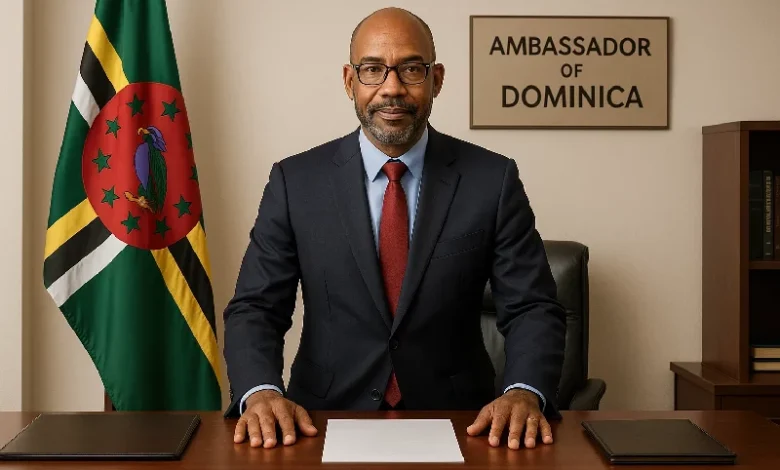Ambassador of Dominica: Roles and Duties

The Ambassador of Dominica serves as the highest-ranking diplomatic envoy of the Commonwealth of Dominica to foreign states, international organisations, or regional blocs. Appointed by the President on the advice of the Cabinet, the ambassador plays a critical role in promoting Dominican interests, protecting its citizens abroad, and representing its positions in global affairs.
As Dominica continues to assert its presence in the international arena, ambassadors remain essential in shaping foreign relations, advancing economic partnerships, and navigating the complexities of regional integration and global diplomacy.
Constitutional Mandate and Appointment
The position of ambassador is authorised under the Constitution of the Commonwealth of Dominica and executed under the Foreign Service Regulations and international diplomatic norms. The Ministry of Foreign Affairs is responsible for overseeing the conduct of Dominica’s foreign service, including the selection and deployment of ambassadors.
Ambassadors are typically appointed based on their diplomatic experience, subject matter expertise, or trusted political service. In some cases, non-resident ambassadors may be appointed to represent Dominica in countries where a permanent mission does not exist. All ambassadors present their credentials to the head of state or relevant authority in the host country, officially confirming their diplomatic status.
Core Roles and Responsibilities
The ambassador’s role is both symbolic and functional. As the official voice of Dominica abroad, the ambassador is entrusted with:
- Representing the State: Ambassadors act as the formal representative of the President and Government of Dominica in bilateral or multilateral settings. They embody the nation’s sovereignty and speak on its behalf in high-level negotiations, treaty discussions, and international summits.
- Promoting Diplomatic Relations: They work to foster friendly relations between Dominica and the host country or institution, enhancing mutual understanding and cooperation on political, social, cultural, and economic matters.
- Safeguarding National Interests: One of the ambassador’s foremost responsibilities is to protect Dominica’s interests abroad. This may include advocating for favourable trade terms, securing developmental assistance, or addressing international policy issues that affect the country.
- Protecting Citizens Abroad: Ambassadors also provide consular support to Dominican nationals living, working, or travelling abroad. In times of emergency, conflict, or legal difficulty, the embassy or consulate under the ambassador’s supervision serves as a point of contact and assistance.
- Promoting Investment and Tourism: Ambassadors often serve as de facto economic envoys, promoting Dominica as an investment destination and advocating for tourism partnerships. This is especially important as Dominica expands its citizenship by investment program and eco-tourism sector.
- Monitoring and Reporting: They observe developments in the host country and report back to the Ministry of Foreign Affairs on relevant political, economic, or social trends. This helps Dominica adapt its foreign policy to changing international dynamics.
Diplomatic Powers and Immunities
Under the Vienna Convention on Diplomatic Relations, ambassadors are granted certain privileges and immunities to ensure they can perform their functions independently and without interference from host governments. These include:
- Diplomatic immunity from criminal and most civil jurisdiction in the host country
- Inviolability of the diplomatic mission premises and official correspondence
- Exemption from taxes and duties related to official functions
- Freedom of movement and communication within the host territory
These powers are not personal benefits but necessary protections that allow the ambassador to carry out their duties effectively in a foreign jurisdiction. However, ambassadors are still accountable to the laws and expectations of the sending state, and breaches of conduct can result in dismissal or recall.
Strategic Importance in Small-State Diplomacy
As a small island developing state, Dominica relies heavily on its ambassadors to build coalitions, gain visibility, and leverage support within international organizations such as the OECS, CARICOM, the United Nations, and the Commonwealth of Nations. Ambassadors serve as vital links in securing climate finance, advocating for debt relief, and negotiating regional initiatives related to trade, health, and disaster resilience.
Given the resource limitations that often affect small nations, Dominica may also assign non-resident ambassadors or high commissioners who are accredited to multiple countries or international organisations. This approach maximises diplomatic reach while keeping operational costs manageable.
Sustaining Foreign Representation
The Ambassador of Dominica plays a foundational role in the country’s external relations. The ambassador’s role extends far past ceremony; they operate as strategist, advocate, and guardian of national priorities. From global capitals to international assemblies, they speak for Dominica, uphold its sovereignty, and represent its people with purpose, both on foreign soil and in support of interests at home.
As Dominica continues to navigate global challenges and pursue development through international engagement, the effectiveness and professionalism of its ambassadors will remain critical to shaping its worldwide reputation and securing its national objectives.




